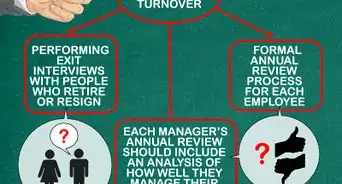This article was co-authored by Elizabeth Douglas and by wikiHow staff writer, Danielle Blinka, MA, MPA. Elizabeth Douglas is the CEO of wikiHow. Elizabeth has over 15 years of experience working and managing teams in the tech industry. She has held roles in multiple areas, including computer engineering, user experience, and product management. She received her BS in Computer Science and her Master of Business Administration (MBA) from Stanford University.
wikiHow marks an article as reader-approved once it receives enough positive feedback. This article has 14 testimonials from our readers, earning it our reader-approved status.
This article has been viewed 903,150 times.
When you’re the boss, you want to do your best to effectively run your organization. But how do you motivate the people who are working for you while still seeming approachable? Whether you’re new to the job or just want to improve your performance, we can help you develop the qualities you need to be a great boss!
Steps
Have an open door policy.
-
Make yourself available to your employees. Open door doesn’t mean that your office door is literally always open. Rather, it means that your employees can come to you with any issues or suggestions that they have, and you will be receptive.[1] X Research source
- If you’re very busy, you can specify times when your employees can filter in or out of your office, or you can make rounds to visit your employees in their workspace.
- Actively listen to your employees to make sure they feel like they're being heard.
- Give serious consideration to employees' suggestions about how to improve productivity—after all, they're the ones on the ground each day!
Respect and value your employees.
-
Let them know you see their hard work. Every employee in your organization contributes to making your business a success. If you acknowledge their contributions, they'll feel appreciated, and they'll be more likely to keep doing good work in the future.[2] X Research source
- Say, “I don’t say it often enough, but we couldn’t keep this place running without your hardwork. Thanks for all you do.”
EXPERT TIPElizabeth Douglas is the CEO of wikiHow. Elizabeth has over 15 years of experience working and managing teams in the tech industry. She has held roles in multiple areas, including computer engineering, user experience, and product management. She received her BS in Computer Science and her Master of Business Administration (MBA) from Stanford University.CEO of wikiHow
 Elizabeth Douglas
Elizabeth Douglas
CEO of wikiHowElizabeth Douglas, CEO of wikiHow, adds: “For the kind of roles that I manage, I think it’s important to empower people to leverage their strengths to create value. This also means you need to listen when they're having problems and be receptive to feedback, both positive and negative.”
Create a positive atmosphere in the workplace.
-
This can help motivate your staff to do their best work. Make your office a pleasant place to work by providing good lighting, encouraging a friendly attitude, and allowing employees to bring in a personal touch, such as family photos or a fun poster. Provide your employees with rewards and incentives for good work, such as a pizza party or a monthly certificate.
- Set up a bulletin board to post about employee’s achievements. You can also create a section for photos of employees and company events.
- Try instituting a casual Friday.
- Make a point to celebrate holidays and birthdays.
Stay involved in the day-to-day activities of the office.
-
Work alongside your employees regularly. It’s easy for a boss to become out of touch with the job tasks of lower level employees. This can create resentment from employees whose jobs you don’t understand, and it prevents you from spotting areas that could benefit from change. Instead, spend some time each week helping your employees with their regular tasks so you'll always know what's going on.[3] X Research source
- Sit in on a planning meeting.
- Join the sales team on the floor.
- Spend a few minutes sorting mail in the mailroom.
Assign tasks that help your employees stretch and grow.
-
Challenge your employees by giving them new assignments. Trust them to get the job done right, even if it's outside of their normal workload. For example, allow junior employees to work on committees alongside senior employees.[4] X Research source
- If you don’t allow your staff to grow, they may seek other opportunities.
- Letting employees try new things can lead to innovation. You can also use it as a strategy to increase the number of people on your staff who are able to complete certain tasks.
- Try to support the career goals of your employees when you can. For instance, if you know an employee is interested in leading a team one day, you might assign them the lead role on a project.
Help your employees when they’re struggling with a task.
-
Create a collaborative, supportive culture. It’s normal for people to hit roadblocks, especially if you’re assigning tasks that stretch your employees. If an employee seems to have hit a barrier that they can’t cross, work with them to get the job done.[5] X Research source
- Don’t take over for your employee. Instead, provide them with assistance, whether it’s from you or another employee who can mentor them.
Provide your employees with the training they need.
-
Offer training sessions, guest speakers, or training videos. Provide ongoing training for current employees in addition to the training you give to new hires. If you have the resources, you could even send your employees to a conference or seminar.
- Monitor your employees to see if they are struggling to meet their work demands, especially if you work in a rapidly changing industry.[6] X Research source
Delegate responsibility to avoid micromanaging.
-
Assign someone to a job and then let them handle it. Delegating helps you get more work done and creates a well-trained workforce. Once a task has been assigned, trust that employee to complete it without you hovering over them.[7] X Research source
- For example, allow problems to work their way up a hierarchical chain before they reach you. This will empower your employees to make more of the day-to-day decisions.
- Stepping in to help an employee who truly needs direction is not the same as micromanaging.
Provide your employees with regular feedback.
-
Good bosses keep their employees well-informed. Employees need to know if you’re happy with their work performance, so tell your employees how they’re doing. You don’t have to have formal evaluations. Instead, incorporate feedback into your workplace operations.[8] X Research source
- Give positive feedback during meetings, right after an employee gives a presentation, or while you walk around the office.
- Meet with employees for a few minutes each week to discuss their projects.
- If an employee is expecting feedback on a project, get back with them ASAP so they don't feel frustrated or anxious.
Give your constructive criticism in private.
-
Don’t criticize or chastise your employees in front of others. While you may think that it creates teaching opportunities, it actually inspires negativity and stress in your employees, who will fear being embarrassed by you in the future. Instead, meet with employees in private.[9] X Research source
- Try to give positive praise at least as often as you offer criticism.[10] X Research source
Reply thoughtfully to emails.
-
Short emails can seem curt. Read all of your emails, and send a timely acknowledgment of receipt. Avoid sending dismissive notes like “Thanks” or “Got it.” Instead, acknowledge what was said.[11] X Research source
- Say, “Thanks for letting me know that the deadline has shifted. I appreciate your hard work.”
Ask for help when you need it.
-
Even bosses need assistance sometimes. Your employees will recognize it as a sign of strength because your aren’t afraid of admitting that you don’t know everything.[12] X Research source
- Say, “I’m mulling over how to approach this merger decision, and I’m open to your suggestions. If you’d like to talk about your ideas or concerns, drop by my office between 2:00 and 5:00 p.m. today.”
Be open to criticism.
-
Use it as an opportunity to grow. Don’t be defensive when your employees criticize your decisions or performance. Instead, consider their comments and decide if they make sense. If they do, consider it an opportunity for growth.[13] X Research source
- Don’t punish people for giving you negative feedback.
- No one is perfect, not even you. It’s normal to make mistakes.
- If you do make a mistake, admit the error and apologize for it.[14] X Research source
Give credit to your team for their hard work.
-
Acknowledge them instead of taking the credit. Consider the organization’s accomplishments to be a group effort. Bad bosses often hog the credit, but good bosses spread it around.
- Acknowledge the contributions of others.
- Congratulate your employees for a job well done.
- When people give you praise, mention the employees who helped you make the accomplishment happen.
Treat your employees equally.
-
Some employees may be better performers than others. Perhaps some even remind you of yourself. Keep these opinions to yourself. Showing favoritism is damaging to the workforce. It can discourage workers who don’t feel favored, and it can cause stagnation in favored employees.[15] X Research source
- If you find yourself focusing your attention on a fraction of your employees, make a point to shift your attention to include others.
- If you go out to lunch or happy hour with employees, make sure everyone is invited.
Maintain some distance from your employees.
-
Engage with them, but keep it professional. When you’re the boss, you have to separate yourself from your employees. While you can still grab lunch or join them for the occasional happy hour, you need to behave professionally the entire time. If employees see you as a peer, you will lose your authority.[16] X Research source
- Maintain strong boundaries around your personal life. Don’t overshare personal details, such as what you did over the weekend or the issues you’re having with a relative.[17] X Research source
- Keep your conversations centered on the workplace or your professional experiences.
- Also, avoid engaging in office gossip. Spreading gossip will destroy your credibility as a boss immediately.[18] X Research source
You Might Also Like










 How to Tell Coworkers You’re Leaving: Guidelines and Sample Emails
How to Tell Coworkers You’re Leaving: Guidelines and Sample Emails

 Managing People at Work: Being Approachable, Problem Solving & More
Managing People at Work: Being Approachable, Problem Solving & More

References
- ↑ https://www.entrepreneur.com/article/246556#
- ↑ http://money.cnn.com/2014/07/24/pf/great-bosses/index.html
- ↑ https://www.fastcompany.com/3050947/5-tips-for-busy-ceos-to-stay-grounded
- ↑ http://www.businessinsider.com/more-signs-you-are-a-good-boss-2016-10
- ↑ https://fortune.com/2014/07/31/5-simple-ways-to-be-a-good-boss/
- ↑ https://www.fastcompany.com/3050947/5-tips-for-busy-ceos-to-stay-grounded
- ↑ http://www.businessinsider.com/more-signs-you-are-a-good-boss-2016-10
- ↑ http://www.businessinsider.com/more-signs-you-are-a-good-boss-2016-10
- ↑ https://fortune.com/2014/07/31/5-simple-ways-to-be-a-good-boss/
- ↑ https://www.fastcompany.com/3050947/5-tips-for-busy-ceos-to-stay-grounded
- ↑ https://www.fastcompany.com/3050947/5-tips-for-busy-ceos-to-stay-grounded
- ↑ https://fortune.com/2014/07/31/5-simple-ways-to-be-a-good-boss/
- ↑ https://fortune.com/2014/07/31/5-simple-ways-to-be-a-good-boss/
- ↑ https://www.fastcompany.com/3050947/5-tips-for-busy-ceos-to-stay-grounded
- ↑ http://www.businessinsider.com/more-signs-you-are-a-good-boss-2016-10
- ↑ https://money.usnews.com/money/blogs/outside-voices-careers/2015/07/16/6-tips-for-becoming-a-good-boss
- ↑ https://fortune.com/2014/07/31/5-simple-ways-to-be-a-good-boss/
- ↑ https://fortune.com/2014/07/31/5-simple-ways-to-be-a-good-boss/
About This Article

If you want to be a good boss, stay involved in the daily activities of the office so you can better understand the jobs and needs of the employees. While you’re at it, listen to their opinions and try to implement the ideas you think are most likely to succeed so they know you value their opinions. To show them you trust them, try to avoid micromanaging them, which will take some of the workload off of you as well. For more advice on being a better boss, including how to communicate with your employees better, keep reading!































































